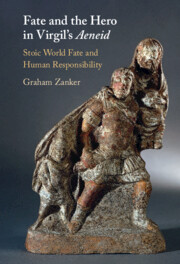Book contents
- Fate and the Hero in Virgil’s Aeneid
- Fate and the Hero in Virgil’s Aeneid
- Copyright page
- Dedication
- Contents
- Preface
- Abbreviations
- Introduction
- Chapter 1 Stoic World Fate and Virgil’s Aeneid
- Chapter 2 Fate and the Human Responsibility of Dido and Aeneas in Aeneid 4: A Case Study
- Chapter 3 Stoic World Fate and the Gods of the Aeneid
- Chapter 4 Stoic World Fate and the Humans of the Aeneid
- Chapter 5 Stoic World Fate and Roman Imperium in the Aeneid: Tragedy and Didacticism
- Book part
- References
- Index Locorum
- Index
Chapter 5 - Stoic World Fate and Roman Imperium in the Aeneid: Tragedy and Didacticism
Published online by Cambridge University Press: 06 April 2023
- Fate and the Hero in Virgil’s Aeneid
- Fate and the Hero in Virgil’s Aeneid
- Copyright page
- Dedication
- Contents
- Preface
- Abbreviations
- Introduction
- Chapter 1 Stoic World Fate and Virgil’s Aeneid
- Chapter 2 Fate and the Human Responsibility of Dido and Aeneas in Aeneid 4: A Case Study
- Chapter 3 Stoic World Fate and the Gods of the Aeneid
- Chapter 4 Stoic World Fate and the Humans of the Aeneid
- Chapter 5 Stoic World Fate and Roman Imperium in the Aeneid: Tragedy and Didacticism
- Book part
- References
- Index Locorum
- Index
Summary
The Aeneid is qualifiedly Augustan. It does not suppress the problems of Augustus’ rise. It foregrounds human tragedy within the range of events in suspension, fortunae, though these cannot impede providential World Fate. Dido and Turnus make choices against fate that are up to them; the fact of fate’s providence makes these and other tragedies even more cruel. Virgil combines the Stoic concept of cosmic fate with the contemporary view that the Roman empire was coterminous with the inhabited world, and he innovatively adds that Rome’s universal fate is Stoically providential. He complicates that model with his emphasis on the human tragedy involved in Rome’s establishment. Rather than being Augustan or anti-Augustan, the Aeneid is realistic in its acceptance of the problems of Augustus’ rise and guardedly optimistic chiefly because of Virgil’s independent didacticism for Augustus. He presents as exempla for Augustus Hercules and Aeneas, though the latter’s defective inclemency to Turnus is meant to encourage Augustus’ well-advertised exercise of clemency. Anchises’ words at Aeneid 6.851–3 have a special didactic application to Augustus: ‘tu regere imperio .... memento’.
Keywords
- Type
- Chapter
- Information
- Fate and the Hero in Virgil's AeneidStoic World Fate and Human Responsibility, pp. 159 - 196Publisher: Cambridge University PressPrint publication year: 2023



